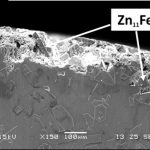In our new collaborative study led by Prof. Eli Aghion from Ben-Gurion University of the Negev in Israel and described in the article entitled The Suitability of Zn– 1.3%Fe Alloy as a Biodegradable Implant Material, published in Metals, we evaluated the possibility of using Fe as a relatively cathodic biocompatible alloying element in zinc that can tune the implant degradation rate via microgalvanic effects. The selected Zn–1.3wt %Fe alloy composition produced by gravity casting was examined in vitro and in vivo. The in vitro examination included immersion tests, potentiodynamic polarization and impedance spectroscopy, all in a simulated physiological environment (phosphate-buffered saline, PBS) at 37 °C. For the in vivo study, two cylindrical disks (seven millimeters diameter and two millimeters height) were implanted into the back midline of male Wister rats. The rats were examined post implantation in terms of weight gain and hematological characteristics, including red blood cell (RBC), hemoglobin (HGB) and white blood cell (WBC) levels. Following retrieval, specimens were examined for corrosion rate measurements and histological analysis of subcutaneous tissue in the implant vicinity. In vivo analysis demonstrated that the Zn–1.3%Fe implant avoided harmful systemic effects. The in vivo and in vitro results indicate that the Zn–1.3%Fe alloy corrosion rate is significantly increased compared to pure zinc. The relatively increased degradation of Zn–1.3%Fe was mainly related to microgalvanic effects produced by a secondary Zn11Fe phase.
Functional materials/surfaces, bioabsorbable materials, and natural minerals
Formulation, separation, processing, characterization, and application
-
Recent Posts
Archives
- August 2022
- June 2022
- May 2022
- December 2021
- July 2021
- March 2021
- January 2021
- December 2020
- November 2020
- July 2020
- March 2020
- February 2020
- December 2019
- November 2019
- September 2019
- August 2019
- July 2019
- June 2019
- May 2019
- April 2019
- March 2019
- February 2019
- January 2019
- December 2018
- November 2018
- August 2018
- July 2018
- June 2018
- April 2018
- March 2018
- February 2018
- January 2018
- December 2017
- November 2017
- October 2017
- September 2017
- August 2017
- July 2017
- June 2017
- May 2017
- April 2017
- March 2017
- February 2017
- January 2017
- December 2016
- November 2016
- October 2016
- September 2016
- August 2016
- July 2016
- June 2016
- May 2016
- April 2016
- March 2016
- February 2016
- January 2016
- December 2015
- November 2015
- October 2015
- September 2015
- August 2015
- July 2015
- June 2015
- May 2015
- April 2015
- March 2015
- February 2015
- December 2014
- November 2014
- October 2014
- September 2014
- April 2014
- January 2014
- October 2013
- July 2013
- June 2013
- May 2013
- April 2013
- March 2013
Categories

